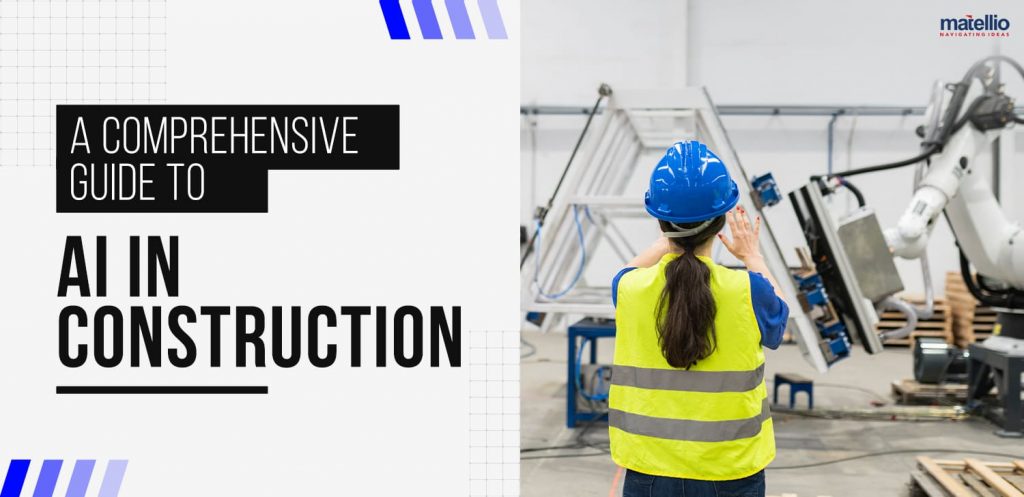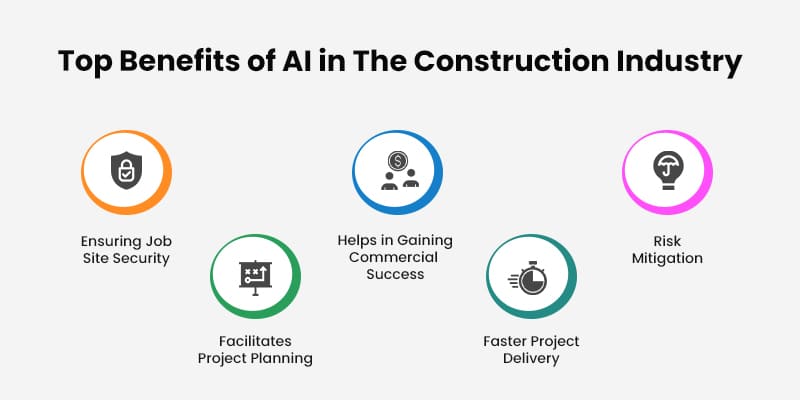
AI can support construction projects at every stage of their development, from project planning and design to management and making workplace environments safer.
Risk mitigation, Smart project management, and job site security are some of the key benefits of using AI-based construction solutions.
In almost every industry, artificial intelligence has a significant impact. The construction industry is one of the major sectors already gaining from the AI revolution. By automating procedures and activities crucial for day-to-day business operations, AI development services assists in overcoming many of the challenges faced by the construction industry.
As it increases productivity and reduces costs, using AI in the construction industry promises to be highly beneficial for businesses.
But what exactly is AI in the construction industry? Let’s find out!
In today’s blog, we’ll discuss the following:
- Where is AI now being used in the building and construction industry?
- What are some actual use cases for AI in the construction industry?
- What are the main advantages of AI in the construction industry?
So, without any further ado, let’s get started!
What is AI in the construction industry?
The construction industry is being strongly influenced by AI. In this industry, AI software development is proving its usefulness with a new degree of automation and process optimization.
The study predicts that the market will expand due to increasing demand for AI-based construction software development, the requirement for more significant security measures at construction sites, and the AI’s potential to lower production costs.
Moving ahead, let’s discuss this,
Top Benefits of AI in The Construction Industry

The key benefits of using AI in the construction industry are:
Ensuring Job Site Security
To improve training and safety procedures or spot potentially hazardous worker behavior, image recognition and classification algorithms can mine data from construction security cameras throughout the job site. Before mistakes happen and cause lost productivity and expenses, they can also assist project managers in identifying and analyzing safety issues.
Helps in Gaining Commercial Success
You can avoid starting from scratch on every project or pitch by utilizing AI and natural language processing (NLP services) to learn from past projects and data. By analyzing prior project bids, reproducing the successful aspects, and avoiding the failure-causing ones, Artificial Intelligence in the construction industry can assist boost a firm’s success rate during the initial tender process. These learning algorithms have the potential to raise a construction company’s win rate, forecast the possibility of a go/no-go scenario, boost profitability, and increase project value.
Risk Mitigation
Every construction site carries some risk, which can take many forms, including quality, safety, time, and cost risk. The greater the project’s size, the greater the risk because numerous subcontractors work on various crafts simultaneously on the construction site.
Contractors can now monitor and assess risk on the job site using AI software development, allowing the project team to concentrate their limited time and resources on the most significant risk issues. Issues are automatically given priority using AI-based solutions in the construction industry. A risk score is used to grade subcontractors so that project managers can closely collaborate with high-risk teams to reduce risk.
Facilitates Project Planning
Many construction firms are leveraging AI to assist with various project planning issues. It has been found that over 35% of construction industry professionals waste their time on unproductive tasks, including dealing with project planning and design issues, paper-based communication, rework, and other things.
The need for AI software development that simplifies the planning process for construction projects by studying and learning from historical data to make smarter choices is increased by such scenarios.
Faster Project Delivery
For precise, less expensive, and less invasive construction projects, civil engineers can apply AI models. This includes utilizing facilities off-site run by autonomous robots that put together crucial parts of a construction project, which human employees subsequently put together on the construction site.
Compared to on-site construction, this greatly increases efficiency in the construction sector and speeds up turnaround time.
AI-based solutions can make prefabricated structures like walls and building panels more quickly than human laborers, freeing them up to work on more difficult chores like installing electrical and HVAC systems and plumbing.
As you’ve seen the top benefits of AI in the construction industry, now let’s move forward and discuss,
What Are Some Actual Use Cases for Ai in the Construction Industry?

The use cases of Artificial intelligence in the construction industry are:
Autonomous Vehicles
Construction managers are heavily leveraging autonomous vehicles to streamline various tasks across the project lifecycle. The use of drones, robotic arms, self-driving cars, and driverless lifts is growing worldwide.
Robots help with bricklaying, wallpaper installation, and concrete pouring, while drones help with surveying and capturing overhead images for analyzing different development phases. On the project site, the robotic intervention also benefits human workers by reducing labor expenses and delays.
Tracking Progress Remotely
A project can be completed faster and more affordably by using drones to collect precise survey maps and aerial images of a construction site and track progress remotely. Additionally, the drone footage can offer project managers a new perspective on the work and aid in identifying potential problems that might not have been seen from the ground.
Project Designing
AI in real estate can sift through enormous volumes of data, investigate multiple models created by various teams, and determine the best design options. According to the specifications, the AI-powered generative design builds 3D models of construction projects, specifies the required actions for each team, and offers insights for architects, engineers, contractors, and designers to manage every stage more effectively.
Scheduling
AI in construction scheduling provides cutting-edge solutions that can help in scheduling. AI develops resource-intensive schedules and offers potential durations, sequences, and work prices to ensure that projects are delivered on time and also within budget by processing the enormous quantities of parameters that comprise a project and monitoring worksite progress on a real-time basis.
Predictive Analytics
Due to poor design, incorrect estimates, unforeseen circumstances, an expansion of the project’s scope, and other factors, construction projects frequently go over budget. According to estimates, 75% of owners of building projects exceeded their projected expenditures, while 77% were late.
Using contract type, project size, and project manager skill data, AI-based predictive models can forecast cost overruns and create realistic project timeframes. Companies can use AI-based solutions to provide reports for completed projects, identify the cause of cost overruns, and create more precise budget projections for ongoing work.
Project Management
By enabling builders to meticulously plan their projects, AI simplifies project management.
The technology can spot scheduling delays and potential problems before they arise. Builders can use custom enterprise solutions to track their projects from the beginning to the end, determining when it’s necessary to reallocate resources, reschedule jobs, or make other adjustments to get them back on track.
A company’s purchase history and patterns can be compared to the amount of material used during the day by construction site managers using AI to help them decide whether to reorder more.
Additionally, AI in the construction industry enables businesses to manage projects more effectively by improving budget assessments, identifying schedule delays, and reallocating resources as needed. This helps to ensure that all tasks are completed on time while continuously monitoring worker safety.
Read More: Leveraging Generative AI in Construction: Practical Use Cases for Industry Leaders
As you’ve seen, the benefits and top use cases of AI in the construction industry. Now, let’s move forward and discuss this,
How to implement AI in your business?
Key steps that you need to take to implement AI in your construction business are:
 Identify the Problem
Identify the Problem
It is crucial to specify the business problem you are seeking to resolve with the help of a custom enterprise solution. This will be useful when you have to present the idea to the stakeholders of the business. The first stage in AI transformation is to evaluate your company’s operations and comprehend your goals and expectations.
 Analyze and Prioritize
Analyze and Prioritize
Knowing and understanding the financial worth of your AI endeavor is crucial. It will assist you in ranking the endeavor according to its value to the business.
- Analyze and evaluate the potential economic and business value of the AI implementations that made the shortlist.
- Avoid getting lost in the long list of initiatives.
 Build a Team
Build a Team
It takes time to put an AI solution into practice. As a result, you require a trustworthy technological partner to complete it for you.
To have particular AI tools or modules created for a large-scale system, you can collaborate with an AI development company. Finding an AI provider with experience creating the ideal solution for a particular use case would be very helpful.
Why choose Matellio for AI software development services?
We provide AI software development services by helping startups, and company owners integrate AI into their current systems and increase profitability.
Our team of highly skilled technology consultants is developing AI platforms that seamlessly interact with current technology to produce competitive results in the future. RPA, predictive analytics, and other technologies are all part of our services. Being the leading AI development company, we build the solutions, combine all the benefits, and advance systems to help your organization become more innovative and faster.
Conclusion
However, even though historically, the construction sector has been among the last to implement smart technologies, businesses are now making rapid advancements in this area. Many businesses are prioritizing investments in enterprise solutions in the hopes of obtaining greater business efficiencies.
Also, nowadays, a lot of businesses are employing AI in the construction industry to create workplace safety solutions. According to experts, AI development services are anticipated to change business models in the construction industry, eliminate costly mistakes, reduce job site injuries, and improve building operations. Last but not least, it is obvious that AI will soon change the way the construction industry operates.
As a leading provider of AI development services, Matellio assists companies in creating cutting-edge, enterprise-level, sector-specific solutions. Thus, get in touch with us and have your construction-related solution prepared.


 Identify the Problem
Identify the Problem Analyze and Prioritize
Analyze and Prioritize Build a Team
Build a Team


